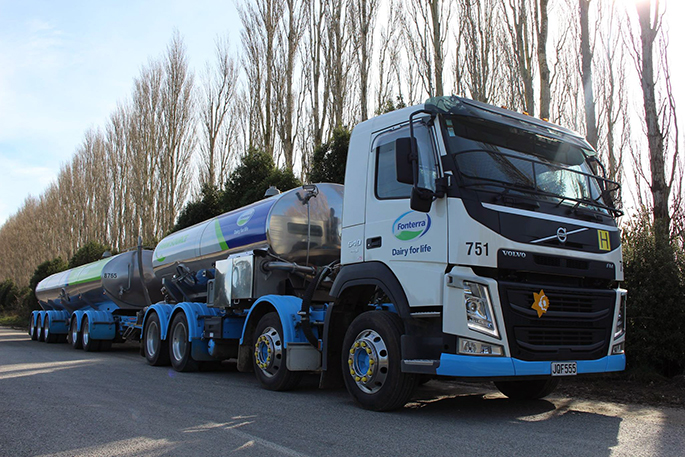The country's first electric milk tank tanker, a solar-panelled bus, electric off-road farm vehicles and new high powered EV charging stations are among projects to receive co-funding from the Government's new-look Low Emission Transport Fund.
"The LETF is all about finding replicable solutions through innovative transport and infrastructure. The projects included in this round show the potential for electric and low-emissions transport across a wide range of sectors: from all-terrain farm vehicles to heavy freight," says Minister of Energy and Resources Dr Megan Woods.
"Some of these are hard to decarbonise, so this is great progress towards reducing our transport emissions.
"We know it makes sense to partner with business as we continue our Covid-19 economic recovery, so we can simultaneously bring down emissions, and seize the opportunities that come from creating new jobs in new industries.
"Focusing on transport in this way will also help us reduce New Zealand's reliance on global energy prices. That's why tackling climate change is such a core part of our economic strategy."
In total, 13 vehicle and technology projects will receive $3,452,025, and 13 EV charging projects will receive $3,001,400 in co-funding.
These include:
· Fonterra will operate NZ's first electric 46T milk tanker with battery-swap technology at the Waitoa Depot, near Tauranga.
· Bayes Coachlines will build a passenger bus with solar panels providing 5-10% of its own power and designed to have greater range and less maintenance than other electric buses.
· MyFleet Rural will launch four Pickman 4WD, fully electric off-road UTVs throughout NZ at Field Days and A&P Shows.
· Firth Industries will deploy NZ's first electric battery-swap concrete mixer truck, to operate in Penrose.
· IntDevice will work with Auckland Transport to deploy a wireless charging ground pad solution at the Ti Rakau Drive depot for an Auckland Transport bus.
· Kiwi H2 has exclusively licensed a UK product ULEMCo Ltd to introduce to NZ to convert diesel vehicles to run on 40 per cent hydrogen, aiming to save 40 per cent emissions. This will help fleets decarbonise until commercially available and viable zero emissions options are available in NZ.
· Zenobe will supplement DC charging capability in grid-constrained areas by installing second-life electric bus batteries.
"The Government expanded the scope of the LETF to increase its impact and encourage innovation in the transport sector. These latest projects show the fund is doing what it is designed to do, with the sector embracing clean energy in some very sophisticated ways," says Woods.
As part of the LETF a significant boost to the nationwide electric vehicle charging network has also been confirmed.
Charging projects include:
· Chargenet will install eight ultrafast chargers in the Auckland CBD, Napier, Whangārei and New Plymouth
· ThunderGrid will install a fast charger in Masterton
· Meridian will install two fast chargers in Christchurch
· Jump Charging will install two ultrafast chargers in the Agritech Business Park in Rakaia.
· Z Energy will install 12 ultrafast chargers at a number of locations in the upper North Island.
In total, the Government has co-funded more than 1,200 public and private EV chargers. The 25 public chargers in this round bring the number of public chargers co-funded to 731, with 561 of those having been installed.
"The EV charging network is growing fast and should give drivers confidence an EV is a great choice, even on long-distance drives. In the last couple of years, we've plugged gaps in places like Bombay, Kaiwaka and Tauranga.
"The focus of the LETF is now turning to ensuring any remaining gaps are filled, as we increase density in high-demand areas.
"What's great to see here is the variety and innovation on offer – from electric milk tankers to wireless charging networks," says Climate Change Minister James Shaw.
"There are so many changes we can make to the way we move about, and together they will make a big difference to lowering emissions. These projects demonstrate the scale of opportunity for decarbonisation in the transport sector.
"In May, the Government will release New Zealand's first Emissions Reduction Plan, which will be full of initiatives like these – across all sectors – to get us firmly on the path to net-zero."
Today's announcement will see a combined total of $6.45 million in government funding go to 26 projects across the two rounds, matched by $9.03 million in applicant funding. The combined investment across these projects is $15.49 million.
Woods announced the LETF co-funding recipients at Orion in Christchurch, who have partnered with the government and others on a number of projects to expand the public EV charging network in Canterbury, including plugging network gaps between Christchurch and the West Coast.
The third and fourth rounds of the LETF will open mid-2022 – visit Low Emission Transport Fund | EECA.



2 comments
Ute tax
Posted on 24-02-2022 20:29 | By Kancho
So levee on tradespeople farmers and outdoor pursuits owners of ute's will pay for this. Suppose it's a little better than subsidies to rich townies buying their EVs. In the meantime we struggle to produce enough power and burn dirty Indonesian coal mined in unsafe conditions
Oh good more taxes down the drain
Posted on 24-02-2022 20:45 | By an_alias
Hydrogen for large vehicles are the way to go, only a fool would use batteries ! Please explain how clear these are, how often batteries are changed, how much recycling is done of batteries ?
Leave a Comment
You must be logged in to make a comment.